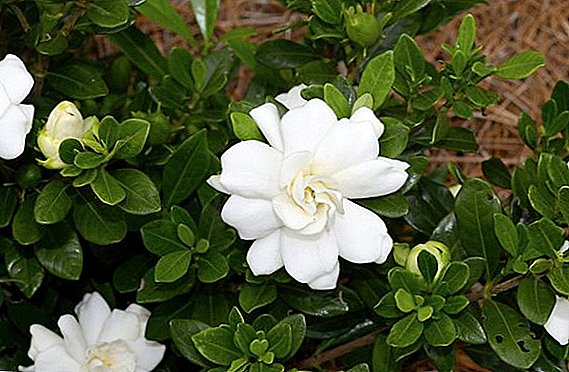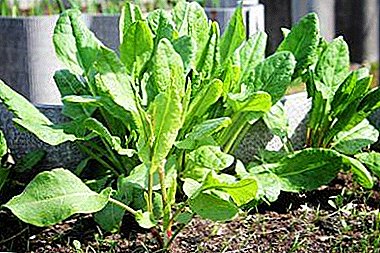
Correct and thorough preparation of seed material - a guarantee of quick germination and good yield increase. Tomato seeds need special stimulation, as they contain inhibitors and essential oils.
Agronomists advise to start preparing for the season even in winter. Among the recommended procedures is disinfection of tomato seeds.
This article describes in detail what a tomato seed disinfection is before planting: how to properly disinfect the material.
What is the need for disinfection of seed?
Disinfection or disinfection is the treatment of inoculum with various preparations (chemical). The purpose of the procedure is the destruction of eggs and larvae of pathogens, fungi, bacteria and viruses on the surface or inside the seed. At home, for the treatment of seed before sowing seedlings are used as improvised components (potassium permanganate, peroxide), and special preparations (Fitosporin).
What effect should be expected from the procedure?
The effect of a well-done soaking is obvious. The following are specific numbers and results that can be achieved.
- Tomato yield increase by 25-30%.
- Uniform and massive pecking seedlings.
- Accelerating the development of seedlings.
- Protection of seedlings from diseases.
80% of seedling diseases are transmitted through seeds and 20% through the soil. Decontamination will help destroy pathogens that sleep on the seeds. The procedure also protects the seed from the parasites that live in the soil.
What seed should be decontaminated before use?
Disinfection of seed is not a mandatory procedure. It should also be carried out very carefully, as it is not suitable for all varieties. Do not require soaking and disinfection hybrid or varieties of imported known breeding.
Be sure to process before planting need seeds:
- purchased in a dubious place or on the market by weight;
- overdue;
- obtained by home selection;
- obtained from diseased fruits or weakened bushes.
How to disinfect: basic methods
How to disinfect the seed of tomatoes before planting in the ground? All methods are divided into 2 large groups.
 The first - dry disinfection. This is the simplest procedure that does not require the use of any ancillary drugs. Seeds for 1-2 hours to make the open sun. Repeat for 7 days. During the solar disinfection, agitate and sort the seeds. The method is optimal for seed that has been stored for a long time in the dark and cold. The sun stimulates germination, kills microbes. An alternative to the sun is an ultraviolet lamp. A day is enough for 2-3 minutes of irradiation for seeds.
The first - dry disinfection. This is the simplest procedure that does not require the use of any ancillary drugs. Seeds for 1-2 hours to make the open sun. Repeat for 7 days. During the solar disinfection, agitate and sort the seeds. The method is optimal for seed that has been stored for a long time in the dark and cold. The sun stimulates germination, kills microbes. An alternative to the sun is an ultraviolet lamp. A day is enough for 2-3 minutes of irradiation for seeds.- The second group - wet disinfection. For carrying out a solution of potassium permanganate, peroxide, boric acid, copper sulfate or stimulating preparations is used.
Disinfectants
Consider the most common means for disinfecting tomato seed: potassium permanganate, hydrogen peroxide and biological products, in particular phytosporin, as well as how to properly soak the seeds.
Potassium permanganate
The working solution is prepared from 1% or 1.5% manganese (1 mg of substance per 1 l of water). Suitable water temperature - The resulting liquid should turn a light pink color. Seeds of tomatoes are placed for 10-15 minutes. This method of disinfection is also suitable for celery seeds, cucumbers, peas. For cabbage, pepper, eggplant and dill, the concentration of manganese should be higher.
After the procedure, the seed is thoroughly washed.. Then it can be soaked for further germination or dried for storage.
Hydrogen peroxide
The useful property of a liquid is not only effective disinfection, but also acceleration of seedling germination. There are several variations of the preparation of the solution.
From the saturation and dosage of the drug depends on the aging time of tomato seeds.
- Undiluted 3% peroxide. Dip seeds for 10-20 minutes.
- 2 tbsp. peroxide to 0.5 liters of water. Leave for 10-12 hours.
- 2 tbsp. on 1 l of water. Hold up to 24 hours.
Biologics
| Name and short description | Act | Instruction | Price |
| Phytosporin. This is a microbiological agent. The drug is non-toxic, soaking in phytosporine is allowed even for use in the apartment. Can be used at different temperatures. Available in the form of paste, liquid or powder. | It can be used at different stages of bush growth (from seed disinfection to protection of flowers and fruits). |
|
|
| Baikal EM. Highly concentrated liquid. The composition has yeast, lactic acid, photosynthetic, nitrogen-fixing elements. | Disinfection of seed, saturation with nutrients for growth and fruiting. Use for protection of tomato bushes from wreckers on all periods of vegetation is allowed. | Dilute 2 hours before use. The proportion of 1: 1000 (per liter jar of 3 ml of the drug). | From 250 rub for 40 ml. |
Common Errors
Common mistake - excessive pre-processing. Disinfection in several different solutions, calcination, heating, freezing, bubbling - the frequencies of these procedures can not stand the seeds and die.
Many agronomists mistakenly believe that poor germination or its complete absence is the result of improper disinfection or soaking. In fact, seedlings may not germinate for a number of other reasons:
 heavy ground;
heavy ground;- strong deepening of the seed;
- cold temperature;
- high acidity of the soil;
- dampness.
In addition to properly conducted disinfection, it is important not to forget about the subsequent actions and conditions - soil composition, temperature, cultivation agrotechnology. Compliance with the basic requirements - a guarantee of friendly shoots.
So, seed disinfection is a recommended but not mandatory procedure. It is necessary to carry it out to destroy harmful microorganisms inside or on the surface of the seed. For the procedure, potassium permanganate, hydrogen peroxide, biologics are used. Hybrid import healthy varieties do not need disinfection.


 The first - dry disinfection. This is the simplest procedure that does not require the use of any ancillary drugs. Seeds for 1-2 hours to make the open sun. Repeat for 7 days. During the solar disinfection, agitate and sort the seeds. The method is optimal for seed that has been stored for a long time in the dark and cold. The sun stimulates germination, kills microbes. An alternative to the sun is an ultraviolet lamp. A day is enough for 2-3 minutes of irradiation for seeds.
The first - dry disinfection. This is the simplest procedure that does not require the use of any ancillary drugs. Seeds for 1-2 hours to make the open sun. Repeat for 7 days. During the solar disinfection, agitate and sort the seeds. The method is optimal for seed that has been stored for a long time in the dark and cold. The sun stimulates germination, kills microbes. An alternative to the sun is an ultraviolet lamp. A day is enough for 2-3 minutes of irradiation for seeds. heavy ground;
heavy ground;









